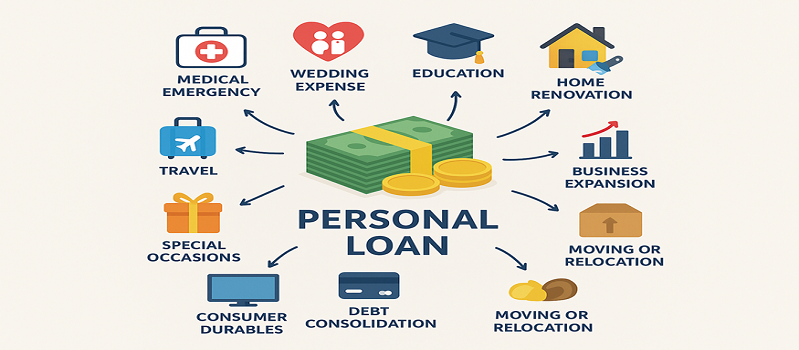Inflation is a phenomenon that is responsible for devaluing the value of money. This clearly states that you will have to spend more money to be able to buy the same thing. The price of the commodities will increase while your income might be the same.
You can imagine how this one financial event can impact your purchasing power. You have to pay an increased price to get the daily essentials. Its impact on your monthly budget does not need further explanation.
It is clear that your personal finances will have to cope with a huge blow. However, perfect planning can safeguard your money from facing any negative impact. Although this type of situation can easily shatter your confidence, this is a usual phenomenon.
Surviving in an inflationary climate should also be one of your financial goals. This is because you will witness such events from time to time. For some temporary respite, you can take the help of short-term unsecured loans.
Any small funding gap can be recovered smoothly. However, you must prepare a repayment plan first, or else, the situation will get out of your control. Some permanent solutions should be figured out so that you can be prepared to face such financial happenings.
This blog is going to guide you in this endeavour. Stay here!
Navigate an inflationary environment with effective strategies
There are different factors that are responsible for the onset of inflation. It can happen when certain businesses suddenly increase the price of products because of a rise in production costs.
Again, inflation might hit when the demand for goods and services increases compared to the supply. Factors like these can set the stage for this phenomenon. Thus, the need of the hour is to be prepared for such situations.
Otherwise, you will not be able to pay money for the necessary items. Then, bills will remain unpaid, and a lot of debt will be accumulated.
An example to understand the effect of inflation on savings
The amount of money you have in your savings account is £ 1000. On it, you will earn an annual interest of 5%. Then, the amount of money saved after one year is £ 1050.
Let’s assume that the rate of inflation for this particular time period is 10%. This means that the item that has cost you £ 1000 this year will cost you £ 1100 next year. Now, you can see that even £ 1050 amount of savings cannot help you cover the increased cost of commodities.
Here, the growth of your savings has failed to keep pace with the rate of inflation. This indicates that you will have to shell out more money than what is available in your cash reserve for emergency purposes.
Ways to protect your finances and sail through an inflationary climate.
· Focus on immediate necessities
Look at your budget to get an idea about the expenses you manage every month. Then, you can point out the necessary and less important payouts. Based on priority, you can adjust the budget plan.
Your main aim should be to make way for some additional savings. The amount of money you can free up from a certain expense can be used for an immediate need. Cost-cutting will become a mandatory process, and you must practise this step again and again.
Basically, you will have to get acquainted with expense management. If your savings are limited, this can help you navigate the situation largely. Prevent yourself from splurging money on desires.
Instead of having that costly latte, prepare your coffee at home. Learn the tricks on how to make a perfect latte at home. You can have the same thing without spending a lot of money.
Making conscious spending decisions in this situation, like inflation, can prove to be a game-changer for you. Assess before you spend money, and half of the problem can be resolved at this stage.
· Diversify your investment
Keeping your money invested in a particular area might not work. This means that you cannot expect a fast growth of your money in this scenario. Invest your money in different ways so that you can take a good advantage of the diversification.
Work with almost everything, like stocks, real estate, bonds, etc. Since you will have money invested in different directions, you will get to see a mixed impact of inflation. Some of these categories might disappoint you, while others will surprise you with the return.
Thus, striking a balance when a major economic event, i.e., inflation, happens is possible with such steps. The amount of risk you will take for one category will be neutralised by another category. If you try to visualise the bigger picture, you can see how inflation cannot have a major impact on your finances.
If you need help deciding where to invest money and where not, an advisor will be the best person to approach. They have years of experience and knowledge of the investment market. You can cash in these things in favour and safeguard your finances during inflation.
· Amplify your income streams
Inflation is not going to be over after a while. This will continue, and you will have to face another bump when this happens next. Thus, the increase in price of commodities will remain, and you have to think of ways to cope with that.
If funds are insufficient in your cash reserve, you must consider adding a few income streams. Other than a job, you must keep some portion of your money invested. Besides, you can try working part-time to generate a surplus stream of income.
The bottom line
If you do not work with these strategies, you will have to face low credit scores. Now, if you have saved money dedicatedly for such purposes, you can avoid looking for options like loans for bad credit on guaranteed approval.
First, it is not a straightforward approval process when your credit scores are unfavourable. Besides, some lenders might levy high interest rates because of this risky situation. The number of lenders you can approach with low savings and low credit scores will be very less.

Emma Anderson is a financial advisor at Quickloanslender who always believes in researching hard to know her clients’ financial problems. She takes the time to understand their financial wants and needs to write the blogs on them as the solutions. In her long 14 years of experience, she has written plenty of blogs on the financial and business sectors of the UK.
Emma Anderson has been recognised for her work in financial planning and her blogs are regularly published in the website of Quickloanslender. As far as her educational qualification is concerned, she has done Masters in Accounting and Finance, and done PG Diploma in Creative Writing.






